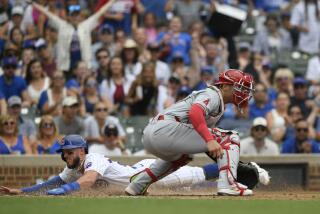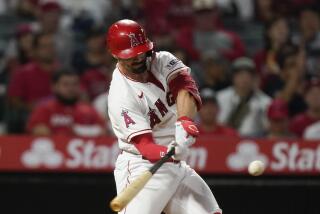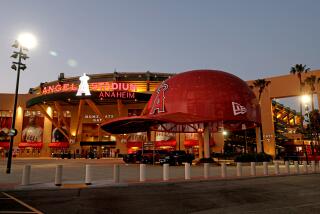Cuban Team’s Visit Ends 26-Year Baseball Drought
- Share via
PALM SPRINGS — Cuba’s recent participation in the first United States Open Amateur baseball tournament at Angels Stadium here marked the first time that its strong national team has played in the United States in 26 years, since it won the Pan American Games title in Chicago in 1959.
The time between appearances would have been only 25 years had Cuba not honored the Soviet-led boycott of last summer’s Olympic Games in Los Angeles.
Cuba, long the dominant team in international amateur baseball, was favored to win the demonstration tournament at Dodger Stadium. Its game with the highly regarded U.S. team was expected to be one of the highlights of the Olympics. As things turned out, Japan, Cuba’s replacement, won the tournament by beating the United States.
Coincidentally, the Cubans played their first game in this tournament on July 28, almost exactly a year later than they were supposed to meet South Korea in the first round of the Olympic tournament.
“It would have been a great sports spectacular if our team played in the Olympics,” Raul Villanueva, vice president of Cuba’s National Institute of Sports, Education and Physical Education, told The Times before the Cubans played their first game here. “But the world knows that Cuba is strong, that Cuba and the United States are the best, so nothing would have been proven. But it would have been interesting.
“Our team was definitely prepared to play and to win the Olympic tournament. We wanted to participate. But for obvious reasons, we couldn’t come.”
Villanueva, the head of the Cuban delegation, was joined for the interview session by Francisco Escoriza, president of the Cuban Baseball Federation; Jose Pineda, manager of the team, and Arnaldo Suarez, an assistant coach. Manny Rodriguez, a Palm Springs police detective, served as the interpreter.
Villanueva said that the team was genuinely excited about playing in the United States, against U.S. teams as well as the foreign teams.
Foreign teams in the tournament, besides Cuba and South Korea, were Taiwan and Australia. Rounding out the field were four Southern California semipro clubs--the Orange County A’s, San Bernardino Pioneers, San Diego Stars and Ventura Royals.
Villanueva said that the tournament would prepare Cuba for what figured to be stronger competition in the Intercontinental Cup tournament now being played at Edmonton, Canada. Cuba is the defending champion, having won in Antwerp, Belgium, in 1983.
“Of course, we want to win here, and then win the Intercontinental Cup, too,” he said.
The Cubans were beaten by Taiwan, 7-2, in the final at Palm Springs.
According to Villanueva, this was the first time that the Cuban national team had been extended an official invitation by the United States to play baseball here. He said there were other occasions when a trip was proposed, but details couldn’t be worked out.
Villanueva said that there was no underlying reason for the team’s presence here, such as a good-will gesture to ease the political tensions between Cuba and the United States. “We received an invitation from the United States Baseball Federation to play,” he said. “We’re just here to play baseball.”
The Cuban traveling party, which numbered 34, including 20 players, flew from Havana to Mexico City, where the team played an exhibition game against an all-star team made up of professional players from the Mexico City Reds and Tigers. Cuba won, 9-3.
Then, on the day the tournament started here, the Cubans flew from Mexico City to Houston, where they cleared customs, and continued into Los Angeles. All but one, that is.
Omar Linares, 17, a shortstop who is regarded as one of the team’s best players, had to remain in Mexico City. While riding a bus, he somehow managed to lose his passport and visa.
Through the efforts of Villanueva, Escoriza and tournament organizer Keith Lowe, who worked with the State Department, Linares eventually received clearance to enter the United States. He missed Cuba’s first game, then arrived in time to at least watch the second one.
Getting Linares into the country, however, was the least of Lowe’s worries. There were times, he said, when he wasn’t sure that the Cubans would come at all. For one thing, they didn’t get clearance for their visas until July 24, three days before the start of the tournament. And he was concerned about the Radio Marti controversy.
Radio Marti is a special service of the Voice of America. The 50,000-watt station, named for Jose Marti, the father of Cuban independence from Spain, is located in the Florida Keys. It began broadcasting in May, offering listeners an alternative to Cuba’s communist-controlled mass media. The Cuban government had already suspended an immigration agreement with the U.S., and Lowe thought the team wouldn’t be allowed to play in America.
A crowd estimated at more than 400, which more than doubled the attendance on opening night, came to Angels Stadium despite the oppressive desert heat to see just how good the Cubans were. About half of them were Spanish-speaking, and they were there to root for Cuba. They sat on the third-base side, behind the Cuban dugout.
There also were a few anti-Castro people in the stands, and they let their feelings be known, too. One middle-aged man sitting behind home plate apparently had had too much to drink, and was particularly loud and offensive. The Cuban players no doubt heard his insults, but they went about their business and did not acknowledge him. He was eventually escorted out of the park without incident.
The Palm Springs Police Dept., wanting to prevent a possible international incident, provided heavy security for the Cubans. Uniformed officers escorted the players to and from their bus at the ballpark. During games, policemen were deployed next to the Cuban dugout as well as in the stands, and the grounds surrounding the park were patrolled.
It was readily apparent, even during pregame warmups, that the Cubans were not typical amateur ballplayers. The ease with which they executed had many in the crowd, which included a few major league scouts, nodding their heads in appreciation. Had they been wearing, say, Dodger uniforms, instead of their bright red ones, many could have passed for big leaguers.
Nearly everyone in the park expected Cuba to rout its opponent, the San Diego semipro club. It didn’t turn out that way.
Rich Aspenlieter a tall, thin right-hander who pitched Class-A ball in the Chicago Cubs’ chain in 1978 and ‘79, limited Cuba to seven hits, and San Diego led after six innings, 4-2.
The feeling persisted, however, that the Cubans could break the game open at any moment. That’s exactly what they did, in the bottom of the seventh inning. They turned an error, two walks and three singles into four runs and went on to win, 6-4.
That Cuba had to come from behind did not surprise Pineda, a heavy-set man rarely seen without a big cigar between his teeth. Pineda, in his third year as the national team’s manager, was a left-handed pitcher on the team that won the world amateur title in 1961.
“There were a lot of factors,” he said. “The time change, the hot weather. And our players are tired from traveling. I’m not surprised at how the game developed. I knew that the teams here would be prepared to play well against Cuba.”
Several veteran players, some of whom helped Cuba win the last three major international tournaments it entered--the Intercontinental Cup in 1983, the Pan American Games in 1983, and the World Amateur championship, held last October in Havana--contributed to the victory.
There was Victor Mesa, the flashy center fielder who had three hits and drove in two runs, including the first one in the seventh inning.
There was Antonio Munoz, the big first baseman whose two-run single gave Cuba the lead.
There was shortstop Pedro Jova, who singled, stole a base and scored twice.
And there was relief pitcher Jorge Valdez, a hard-throwing left-hander who allowed only two singles and struck out six over the final 3 innings.
The mainstays of the team are Mesa, Munoz, Jova, Luis Casanova, Antonio Pacheco, Lourdes Gouriel, Juan Castro--no relation to Fidel--Pedro Medina, Valdez, and Reinaldo Costa. They would have competed in the Olympic tournament. They’re also the players who led Cuba to the world championship. Some of the supporting cast, though, is different these days.
“There are eight players on this team that weren’t on the world championship team or on the team that would have played in the Olympics,” Escoriza said. “They improved, and earned positions on the team. This shows that we are constantly producing quality players.”
Mesa, Casanova, the left fielder; and Pacheco, the second baseman, are said to have enough talent that they could step right into a major league lineup. Seven or eight other players probably could play at the Double-A or Triple-A level.
But don’t expect to see any of them playing on American pro teams because Fidel Castro will not allow it. He calls himself Cuba’s No. 1 baseball fan, and he wants his players to stay at home. According to Villanueva, they are more than happy to oblige.
“Our players have no desire to play professional baseball,” Villanueva said. “Their vision of sport is different from players here. They play for the sake of playing. And they love to play for their country.
“Now that’s not to say that our players are opposed to professional baseball here. They’re just happy to be amateurs.”
Munoz is one of the players who perhaps could have turned professional. As have several of his teammates, he has been offered a lot of money by several countries, among them Italy and Venezuela.
Munoz, a member of the national team since 1974, is 36 and one of the oldest players on the team. He’s 6 feet 2 inches, weighs about 210 pounds and bears a striking resemblance to one of his famous countrymen, heavyweight boxer Teofilo Stevenson.
“I never considered the offers because I never wanted to leave my country,” he said. “It is a pleasure to play for my country. I have the support of my country. I get everything I need. The revolutionary government supports me well.”
Munoz disagreed with the popular notion that Cuban baseball players are, in effect, professionals, that they are paid for playing.
“No,” he said. “I am provided with a home, a car and expenses. In the off-season, I am a professor of physical education, and the money I get is for my job, not for playing baseball.”
Munoz said that there’s a pay scale in Cuba, that people get paid according to the importance of their jobs. The average monthly wage is about $180. Munoz said he gets $211, but added that there are some musicians who get about $500.
So, it’s extremely doubtful that Mesa, Casanova, Pacheco and the others will follow in the footsteps of Tony Oliva, Luis Tiant, Mike Cuellar and Bert Campaneris and play in the major leagues. But there is a chance that you may see them play in a big league ballpark.
“We would like to come back,” Villanueva said. “Maybe one day our national team could play an exhibition series against an American major league team, just to see how we’d do. That would be interesting.”
More to Read
Go beyond the scoreboard
Get the latest on L.A.'s teams in the daily Sports Report newsletter.
You may occasionally receive promotional content from the Los Angeles Times.










